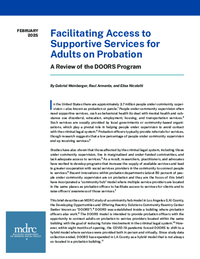Facilitating Access to Supportive Services for Adults on Probation
A Review of the DOORS Program

In the United States there are approximately 3.7 million people under community supervision—also known as probation or parole. People under community supervision often need supportive services, such as behavioral health (to deal with mental health and substance use disorders), education, employment, housing, and transportation services. Such services are usually provided by local governments or community-based organizations, which play a pivotal role in helping people under supervision to avoid contact with the criminal legal system. Probation officers typically provide referrals for services, though research suggests that a low percentage of people under community supervision end up receiving services. (About 80 percent of people under community supervision are on probation and they are the focus of this brief.)
Studies have also shown that those affected by the criminal legal system, including those under community supervision, live in marginalized and underfunded communities, and lack adequate access to services. As a result, researchers, practitioners, and advocates have worked to develop programs that increase the supply of available services and lead to greater cooperation with social services providers in the community to connect people to services. Recent innovations within probation departments have incorporated a “community hub” model where multiple service providers are located in the same places as probation offices to facilitate access to services for clients and to raise officers’ awareness of those services.
This brief describes an MDRC study of a community hub model in Los Angeles (LA) County, the Developing Opportunities and Offering Reentry Solutions Community Reentry Center (better known as “DOORS”). DOORS was established inside a building where probation officers also work. The DOORS model is intended to provide probation officers with the opportunity to connect adults on probation to service providers located within the same building with the goal of reducing future involvement in the criminal legal system. However, within eight months of opening, the COVID-19 pandemic forced DOORS to shift to a hybrid model where services were provided both in person and virtually. Since study data collection ended, DOORS has expanded in LA County as a hybrid model that is not always located in a probation building.







